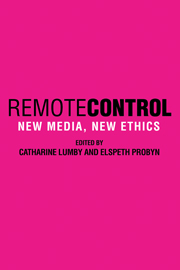Book contents
- Frontmatter
- Contents
- List of Contributors
- Acknowledgements
- 1 Introduction: An Ethics of Engagement
- 2 Real Appeal: The Ethics of Reality TV
- 3 Arguing about Ethics
- 4 ‘Their own media in their own language’
- Beyond the Disconnect: Practical Ethics
- 5 A Viable Ethics: Journalists and the ‘Ethnic Question’
- 6 Ethics, Entertainment and the Tabloid: The Case of Talkback Radio in Australia
- Money versus Ethics
- 7 Eating into Ethics: Passion, Food and Journalism
- Beyond Food Porn
- 8 Ethics impossible? Advertising and the Infomercial
- Pitching to the ‘Tribes’: New Ad Techniques
- 9 Diary of a Webdiarist: Ethics Goes Online
- 10 Control-SHIFT: Censorship and the Internet
- Representing the Asylum Seekers
- 11 The Ethics of Porn on the Net
- Ethics and Sex
- 12 Grassroots Ethics: The Case of Souths versus News Corporation
- 13 Great Pretenders: Ethics and the Rise of Pranksterism
- The Limits of Satire
- Index
8 - Ethics impossible? Advertising and the Infomercial
Published online by Cambridge University Press: 18 December 2009
- Frontmatter
- Contents
- List of Contributors
- Acknowledgements
- 1 Introduction: An Ethics of Engagement
- 2 Real Appeal: The Ethics of Reality TV
- 3 Arguing about Ethics
- 4 ‘Their own media in their own language’
- Beyond the Disconnect: Practical Ethics
- 5 A Viable Ethics: Journalists and the ‘Ethnic Question’
- 6 Ethics, Entertainment and the Tabloid: The Case of Talkback Radio in Australia
- Money versus Ethics
- 7 Eating into Ethics: Passion, Food and Journalism
- Beyond Food Porn
- 8 Ethics impossible? Advertising and the Infomercial
- Pitching to the ‘Tribes’: New Ad Techniques
- 9 Diary of a Webdiarist: Ethics Goes Online
- 10 Control-SHIFT: Censorship and the Internet
- Representing the Asylum Seekers
- 11 The Ethics of Porn on the Net
- Ethics and Sex
- 12 Grassroots Ethics: The Case of Souths versus News Corporation
- 13 Great Pretenders: Ethics and the Rise of Pranksterism
- The Limits of Satire
- Index
Summary
INTRODUCTION
IS THIS COOL OR WHAT? THE HIP HOP E-MAIL LIST YOU SUBSCRIBE TO invites you on a free ride to a mystery destination where one of your favourite bands will do a concert especially for you and your like-minded peers. It's a great day out, although you notice that the refreshment tent is sponsored by a company that makes alcoholic fruit drinks. Hip young people wander amongst the crowd, offering free bottles of a new brand you haven't seen before. Of course, you don't have to take them.
Here's another one. Your workplace is smoke-free but you haven't kicked the habit yet. There you are with the other office smokers, freezing on the footpath for your hit, and a pretty girl with a lovely smile comes and offers you a cup of hot coffee. Good one! As you gratefully accept it, she tells you it is ‘courtesy of’ – and names a brand of cigarettes.
Welcome to the world of guerilla marketing.
Most thinking about ethics in advertising tends to focus on regulating and curbing advertisements that are seen as problematic. Advertisements that are perceived by audiences to be sexist (or too sexy), that use discriminatory stereotypes, may encourage behaviour our society defines as deviant, or that unfairly target children – these are seen as examples of unethical behaviour by the advertising industry. Such advertisements are regularly the focus of concern in the media and of complaints by the public.
- Type
- Chapter
- Information
- Remote ControlNew Media, New Ethics, pp. 133 - 151Publisher: Cambridge University PressPrint publication year: 2003
- 1
- Cited by



